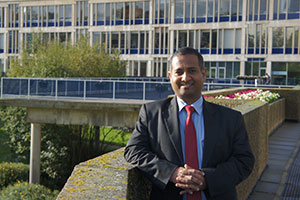
Dr Ahmed Shaheed
The latest report by the United Nations (UN) Special Rapporteur on the Situation of Human Rights in Iran has revealed that despite President Hassan Rouhani’s recent use of social media, freedom of speech and access to information in the country remains restricted.
Dr Ahmed Shaheed, Visiting Professor in the School of Law at the University of Essex, has found that journalists and bloggers continue to face persecution and intimidation, access to the internet and certain sites is restricted or prohibited, and human rights defenders and activists face imprisonment.
In his report presented to the UN General Assembly this month, Dr Shaheed renewed his call for the Iranian Government to engage with UN human rights mechanisms “in a meaningful and constructive manner, including by admitting him to the country.”
In his assessment of freedom of expression and access to information, Dr Shaheed has revealed that the Iranian Government considers 600 Iranian journalists to be part of an anti-State network; that 67 internet cafes were reportedly closed in July 2013 alone; and that at least 40 journalists and 29 bloggers and online activists are imprisoned in the country.
He has highlighted too the arrest of 15 journalists between 25 and 27 January 2013, the largest mass arrest of journalists in the country since 2009.
A study of access to Wikipedia pages has found that 964 Persian-language articles on a range of topics are blocked by the authorities as are articles providing public health information about sexual and reproductive health.
Human rights defenders conducting peaceful activities to advance human rights or provide humanitarian assistance too face persecution. This includes the ongoing detention of at least 30 aid workers allegedly arrested in connection with their work to provide shelter and supplies to victims of the August 2012 earthquake in east Azerbaijan.
Aside from free speech and access to information, Dr Shaheed’s report has highlighted the continuing high rate of execution, often for crimes not considered capital offences by international standards. He has revealed that between January 2012 and June 2013 there were as many as 724 officially-announced executions, whilst reports of suspected secret executions could mean the overall total is much higher.
Reports of the execution of Afghan refugees attempting to cross the border into Iran, as well as a spate of 38 officially-announced executions and a further 44 reportedly unannounced ones in the weeks after the 2013 presidential elections, are also cause for alarm according to the report. Dr Shaheed has once again called for a moratorium on all executions.
Dr Shaheed’s report, based on more than 130 interviews, has also explored alleged human rights violations in relation to prison conditions, other forms of cruel and inhuman punishment such as stoning, impunity, women’s rights, freedom of religion and ethnic minorities, and the impact of sanctions on the country.
Read the report in full.
More information
For further information contact the University of Essex Communications Office, telephone: 01206 873529 or e-mail: comms@essex.ac.uk.
Find out more about Dr Shaheed on his official website. Follow him on twitter at @shaheedsr
Dr Shaheed presented his report to the UN General Assembly in New York on 23 October. Read his opening statement.